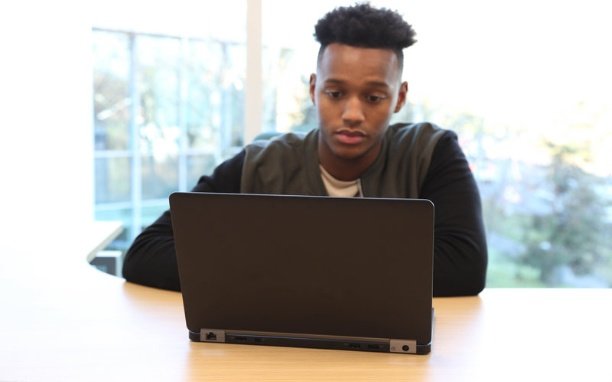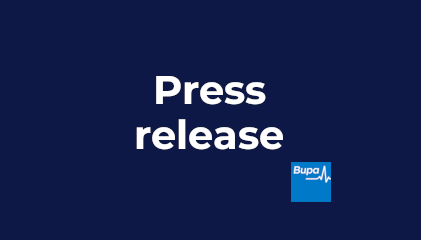- Three in four 13-19 year olds have experienced physical health issues related to poor mental health since March of last year
- Half have turned to harmful coping mechanisms – including drink, drugs or self-harm – to alleviate symptoms – the majority feel pessimistic about their future
- 45% of parents admit that they need more guidance on how to talk to their teens about mental health
- With the UK now in its third national lockdown Bupa launches its Teen Minds campaign to support families and children with its mental health services, including a Family Mental HealthLine for health insurance customers.

The mental health toll of the pandemic has left three in four teens experiencing physical health issues including hair loss, digestive problems, migraines, lethargy or weight changes.
Some 4.12 million young people have experienced symptoms of poor mental health over the last ten months – many for the first time1 according to a new study by Bupa as part of its Teen Minds: Living Through a Pandemic and Beyond campaign. These issues have manifested as physical health issues for 3.9 million3, with many feeling close to breaking point.
With further disruption expected in light of school closures and national lockdown, mental health experts at Bupa are encouraging parents to remain vigilant to the warning signs and regularly check in with their teenage child to see how they’re coping.
Concerns about the impact on academic achievement (73%) and job prospects (70%) after the pandemic are weighing on young people’s minds, particularly among 16-17 year olds4 – leading to a majority of teens (57%) not feeling or knowing whether they feel optimistic about their future.
Many teenagers have struggled with being ‘stuck’ in the family home for long periods of time (47%), socialising less with friends (55%) and feeling powerless about their situation (31%).Over half of teens (55%) feel their life is in a state of ‘limbo’, while three in 10 (30%) feel the pandemic means they’re missing out on life.
Pablo Vandenabeele, Clinical Director for Mental Health at Bupa Insurance said: “The impact of the pandemic on mental health has been well documented and teenagers have experienced disproportionate levels of uncertainty during the pandemic, and at an already emotionally turbulent stage in life. It’s worrying to see that their mental and physical health has deteriorated so much over this period. What we have seen, both in our research, and speaking with customers over the course of the pandemic, is that parents find this a big challenge, and they are looking for more support on how to manage discussions about their teenager’s mental wellbeing.
“That’s why we at Bupa have been investing in our mental health services for our UK health insurance customers, including cover for more conditions, ongoing support for longer term conditions and further support to families who are worried about their child’s mental wellbeing through our Family Mental HealthLine.”
Coping strategies
Worryingly, the study reveals over half of teenagers have turned to harmful coping mechanisms to manage their mental health during the pandemic (52%), such as controlling or restricting their food intake, picking their skin (excoriation), pulling out their hair (trichotillomania) and self-harm.5 While others admit to smoking, drinking and taking drugs as their form of escape6.
The majority admitted these strategies created a ‘distraction from COVID’ and made them feel ‘in control’ but ‘worse in the long term’.
However, the research also found many teenagers are taking positive action to manage their mental health. Almost half (49%) have channelled poor mental health into exercise, while others have socialised virtually with friends (34%), focused on school work (18%), reading (21%) and one in 10 have started a new hobby or learnt a new skill (9%).
And for 44 per cent of teenagers, lockdown has made them more likely to discuss their mental health generally.
Teen-parent relationships
Whilst many teenagers (68%) feel comfortable talking to their parents about their problems a significant proportion (34%) of teens are struggling to confide in their parents, with many (29%) feeling their parents wouldn’t understand what they’re going through. And whilst over half of parents (54%) acknowledge that their relationship with their child has improved during the pandemic, many parents need more guidance on how to talk to their teens about mental health (35%).
So with parents worried about the impact of the latest lockdown on their teenager's mental health (49%), Bupa has launched its Teen Minds: Living Through a Pandemic and Beyond campaign including a new teen mental health page with advice to help families talk about these issues, and a video featuring some famous faces talking first hand about their experiences. Bupa also offers a Family Mental HealthLine to its UK health insurance customers where parents can access a team of trained advisors and mental health nurses to listen and provide advice, guidance and support.
Pablo continued: “Teenage behaviour is often filled with highs and lows so sometimes it may be difficult for parents to distinguish between this and symptoms of mental ill-heath. Particularly at a time of such uncertainty, with further lockdown restrictions expected, and many returning to school. Our advice to parents is to stay vigilant for warning signs of something more serious affecting your child. Are they showing signs of regular low mood or physical symptoms like weight loss or gain or lethargy? And how long has it been going on for?
“If your child is struggling and you’ve noticed it persisting for more than two weeks, starting a conversation with them is the first step. It is also important to recognise when to seek medical help. Early diagnosis can lead to a better long-term prognosis for mental health conditions, which can help your teenager and your family return to their “normal” as soon as they can.”
Dr Lucy Foulkes, Teen Psychologist, commented: “The COVID-19 pandemic has been incredibly difficult for many teenagers so it’s understandable that this has taken a toll on their mental and physical health. From this research, it’s particularly useful and important to learn about coping mechanisms. Some young people might be coping in unhealthy ways - such as by restricting eating or self-harming - and if parents are concerned, they should start an open conversation about it and seek professional advice if needed.
“It’s encouraging to note that many young people are coping in positive ways - like exercising, spending time with friends (sometimes online), and taking up new hobbies. The pandemic could therefore be an opportunity to check in with teenagers and have a discussion about helpful and unhelpful ways of looking after yourself during periods of stress and difficulty.”
Stephen Buckley, Head of Information at mental health charity Mind said: “At Mind we’ve seen a huge increase in young people telling us about mental health issues – this group has been hit with some of the biggest changes to their normal lives, as well as a lack of agency or ability to make decisions for themselves.
“So it’s encouraging to see that many parents are planning to address these issues and have important mental health conversations with their children. I’d encourage parents to take the lead in this, as we all know that teenagers can be reticent, or may not have the words, to say how they really feel. But by making these conversations feel normal and everyday, we can help make sure that those who need help receive it.”
Download the full report - Teen Minds: Living Through a Pandemic and Beyond
Notes to editor
2020.between 22 October- 3 November Bupa commissioned PCP Research to survey 1,000 UK teenagers between 13-19, and 1,000 of their parents
- 30% of those who experienced symptoms of poor mental health said they hadn’t experienced this before the pandemic
- The office of national statistics estimates that there are 5,146,658 teenagers aged between 13-19 in the UK. According to Bupa research 80% of teenagers have suffered a mental health symptom since lockdown, equating to 4,117,326 teenagers
- The office of national statistics estimates that there are 5,146,658 teenagers aged between 13-19 in the UK. According to Bupa research 76% of teenagers have reported a physical symptom of poor mental health since lockdown begun in March equating to 3,911,460 teenagers
- 16-17 year olds are the most worried about the impact on academic attainment (74% vs 73% on average) as well as their job prospects (73% vs 70% on average)
- 5% self-harmed, 11% controlled or restrict their food intake, 12% picked their skin (excoriation). 5% pulled out hairs from their body (trichotillomania)
- 7% used smoking to manage their mental health. 9% used drinking and 3% used illegal drugs
About Bupa’s mental health services
*Designed for individuals and families, key features of the mental health cover for our UK health insurance customers include:
- Extended cover with all* mental health conditions covered – Bupa covers all addictions, including drug, alcohol, and non-substance related addictions.
- No time limits – mental health conditions are complex and can recur. Bupa customers will have access to medical treatment and support if their condition comes back
- Ongoing support. – those diagnosed with mental health conditions will be provided with help to manage their condition and prevent worsening symptoms. For example, if treatment involves ongoing, daily medication, they will have regular reviews to ensure they are on the most effective and appropriate treatment. If there is a clinical need, customers can have a follow-up appointment with a consultant psychiatrist
Support is for all new customers and renewing customers where they have mental health cover, provided within members’ individual mental health benefit limits. The only exceptions are dementia and learning, behavioural and developmental conditions. *
The Bupa Family Mental HealthLine is available to Bupa UK health insurance customers between 8am – 6pm, Monday to Friday, by calling: 0345 266 7938. It provides:
- A team of trained advisors and mental health nurses to listen and provide advice, guidance and support
- Signposting to online resources for additional support and guidance
- Nurse-led case management to help parents with all aspects of their child’s mental health wellbeing, including planning and co-ordinating specialist care if needed
Bupa Direct Access is a self-referral service which gives health insurance customers access to mental health specialists, without needing a GP referral.
The Bupa UK Foundation and Mind currently work together to offer young people and their families access to a brand-new set of free and practical online information resources to help improve their mental health – with the aim of reaching 2.5 million young people and their families by the end of 2022.
About Bupa
Bupa's purpose is helping people live longer, healthier, happier lives and making a better world.
We are an international healthcare company serving over 31 million customers worldwide. With no shareholders, we reinvest profits into providing more and better healthcare for the benefit of current and future customers.
We directly employ around 85,000 people, principally in the UK, Australia, Spain, Chile, Poland, New Zealand, Hong Kong SAR, Turkey, Brazil, Mexico, the US, Middle East and Ireland. We also have associate businesses in Saudi Arabia and India.



